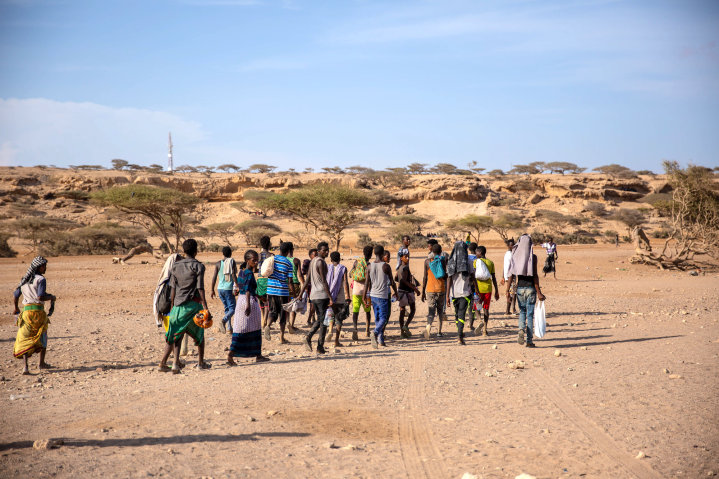ISS TODAY OP-ED
East Africa refugees need coordinated action plans for protection rather than hollow pledges

States are committed to helping refugees, but their ability to share the burden beyond their borders is limited.
Despite East Africa’s recent commitments, it is becoming increasingly difficult for countries in the region to sustain financial support for refugees and host communities.
On 16 June, the Intergovernmental Authority on Development (Igad) and East African Community (EAC) signed the Munyonyo declaration on durable solutions for refugees, and made pledges ahead of the 13-15 December Global Refugee Forum. The pledges commit member states to enhancing regional refugee policies, improving economic inclusion for refugees, reducing forced displacement and preventing armed conflicts.
The Global Refugee Forum has designated East Africa as one of three Support Platforms for responsibility sharing. This approach recognises that a sustainable solution cannot be achieved without cooperation between countries. In this case, it seeks to bolster East African responses with support from the international community.
However, due to financial constraints, refugee-hosting states have trouble delivering the amenities, services and refugee protection that are core to responsibility sharing. This could mean that East Africa’s pledges at the upcoming Global Refugee Forum may amount to little more than good intentions.
Most East African states struggle to allocate the institutional and financial capacities required to manage and assist refugees within their borders. Except for Kenya, many lack comprehensive policies and have a fragmented approach to mitigating refugee risk factors at the country level.
Burden and responsibility sharing has also become a political concern as states weigh the economic cost of protecting refugees against the needs of host communities. This has compelled East African countries to adopt state-specific rather than regional approaches to refugee management.
One example is the encampment policy, which allows for the designation of refugee camps. The existence of over 300 active refugee settlements across East Africa highlights the plight of refugees, whose presence ignites fierce debates on political, economic and human security.
These approaches persist even though several states in the region have been lauded for their progressive approach to refugees. Although Ethiopia, Kenya and Uganda maintain open-door policies, they still use encampments, which hampers refugees’ social and economic integration and well-being and discourages self-reliance.
Read more in Daily Maverick: Growing mixed migration crisis in East Africa fuelled by lack of political goodwill and consensus
To address the crisis, more advanced refugee governance practices must be replicated and scaled up. Uganda, for example, opts for the refugee settlement scheme, which permits refugees to live in communities rather than encampments. The model encourages self-reliance and integration by giving refugees access to economic opportunities, education and land for farming. It reduces reliance on aid and contributes to local economies. Ethiopia’s policy allows refugees to reside outside camps, granting them mobility and access to economic opportunities.
So, while host states in East Africa have done a lot to resolve the refugee crisis, their ability to extend their burden and responsibility-sharing activities is limited. To ensure that EAC-Igad’s refugee pledges are realised, countries must strengthen their action plans. The focus should be on increasing national resources to sustain infrastructure, services and programmes for refugees’ protection.
Long-term success commitments
Delays in implementing policy on refugees, and legal and regulatory impediments, also limit the chances that pledges and long-term solutions will succeed. This shows that not all East African states are equally committed to fully implementing the required policies. The continued securitisation of refugee issues lends legitimacy to restrictive measures by host states, and prevents sustainable solutions. Kenya for example has increased security measures in response to terrorist concerns related to refugee camps.
As the number of refugees in East Africa continues to rise, it has become evident that a comprehensive and sustainable approach is vital. This must go beyond the usual techniques of providing temporary housing and basic requirements. Countries should recognise that the refugee crisis is not a local issue, but one that is influenced by regional and global affairs — necessitating a coordinated effort.
Prioritising burden and responsibility sharing through the EAC-Igad pledges is a key milestone in the region’s response. However, effective collaboration is hampered by countries’ diverse objectives, interests and capacity gaps.
For the pledges to be achievable, national policies are needed that outline the mechanics of burden and responsibility sharing, with specific measures to accelerate and harmonise refugee management. This will bring the region another step closer to an approach that improves the lives and prospects of East Africa’s many refugees. DM
James Owino, Consultant, Migration, Institute for Security Studies (ISS) Pretoria.
First published by ISS Today.
















 Become an Insider
Become an Insider
Comments - Please login in order to comment.